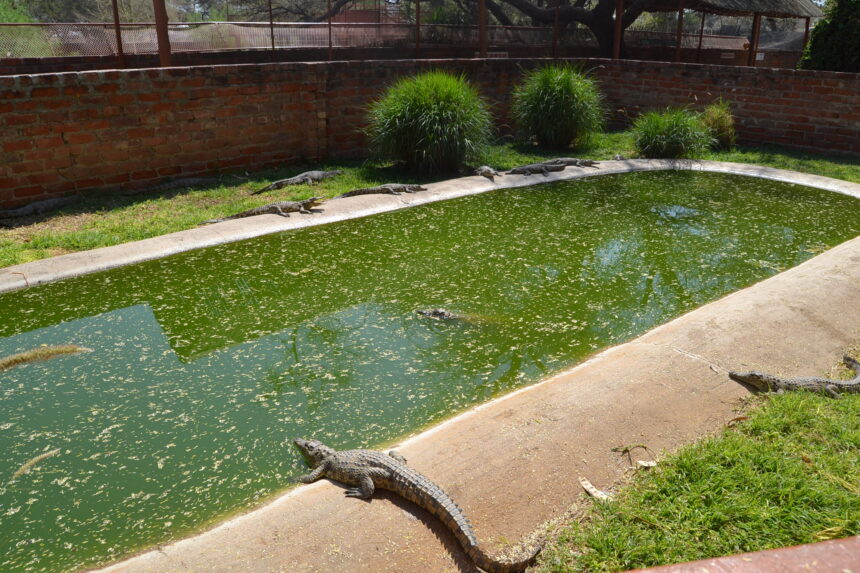The only functional commercial and tourism attraction crocodile farm in Namibia, located in the heart of Otjiwarongo, continues to penetrate the Asian and European markets.
This is so despite Covid-19’s restrictive global health protocols that dragged on for two years before international markets opened up.
The crocodile ranch, which houses approximately 2 000 semi-aquatic reptiles, has been doing its best to revive the farm, and to ensure that it recovers and emerges stronger after the shocks that have been caused by the Covid-19 pandemic.
Tourism is one of the sectors most-affected by the Covid-19 pandemic, impacting economies, livelihoods, public services and opportunities on all continents. Founded in 1980, the Otjiwarongo crocodile ranch trades in crocodile products and protects Namibia’s vulnerable Nile crocodile population. It harvests the pelts and fillets of the animals.
The ranch also provides a safe venue for visitors to see, touch and even taste crocodile meat.
The farm was established years ago to produce crocodile hatchlings for South African farmers, and to offer a different tourist attraction along the main route to and from Namibia’s northern regions.
The owner of the Otjiwarongo Crocodile farm, Dieter Noelle, together with his wife Annè, took over the then-struggling farm more than 10 years ago.
New Era caught up with Annè, who remains hands-on in ensuring the farm is up and running, despite the many economic headwinds brought about by the negative effects of the pandemic.
“Covid-19 has really hit us hard, but business has picked up very beautifully again. The tourists are wonderful, and we are grateful for that,” she noted.
She said it’s nonetheless quite a process to get used to this stress again because people were often complacent and relaxed during Covid-19.
No one had to exert themselves during Covid-19, and people therefore find it impossible or very difficult to cope with the stress now that work resumed on a normal basis.
According to Noelle, this complacency negatively influences the ranch’s productivity and work ethic.
“People just give in. They stay away. They start drinking, and they don’t pitch. It is very stressful. But the few ‘donkeys’ who stay behind are trying to cope,” she added.
In terms of the crocodile skin business, sales are picking up, although customers are buying at half-price.
The other difficult issue she mentioned is the transport costs of shipping skins to international markets.
“At least they are buying. We can engage in the export markets again. People have to save on transport costs because of the fuel prices, which are so expensive,” she stated.
Before Covid-19 caused havoc, the couple used to export their skin products from Windhoek, and flew them straight to their main export market in South Korea.
At the moment, the duo takes their skin products to Durban, where all crocodile skins from southern Africa are collected and shipped to export markets such as South Korea.
“We are trying our best. It’s not easy to export via South Africa. You miss opportunities. I am, however, grateful for the new business, but the stress has escalated. Your local clients have to cope with a limited budget. They are demanding and they are unhappy. They want you to make them happy when they come and sit here. We suffer. That’s the problem, but I am grateful to the people who try to keep their work ethics and markets that opened again,” said the soft-spoken Noelle.
The couple also invested in a garden to keep the ranch attractive and green.
According to her, the crocodile population is healthy, although they didn’t hatch a lot of eggs during Covid-19.
She, however, said uncertainty sometimes clouds them as to how many eggs should be hatched due to the volatility of the market.
“The crocodile population is much less than before. We didn’t hatch. We destroyed the eggs. Food and electricity are expensive. We had to cut our running costs. We were not sure if we were going to be able to sell. The market actually tumbled before Covid-19 when Russia moved into Crimea. It influenced the whole international industry. We have approximately 2 000 crocodiles at the moment, and that’s half of the number of crocs we had before. In Zimbabwe, they are producing 40 000 skins per year. They must have about 120 000 crocs,” she observed.
She proudly pointed out that the ranch did not lay off any of its workers during Covid-19, unlike other businesses, especially in the tourism industry, where many people lost their jobs.
“As Namibians, we must look at our work ethic. When the going gets tough, we must get tough. Business life is not for sissies. We still serve the croc dish. The Europeans are mad about it; they really love it. We are trying to serve our beautiful dish with a smile,” Noelle noted.
–anakale@nepc.com.na



